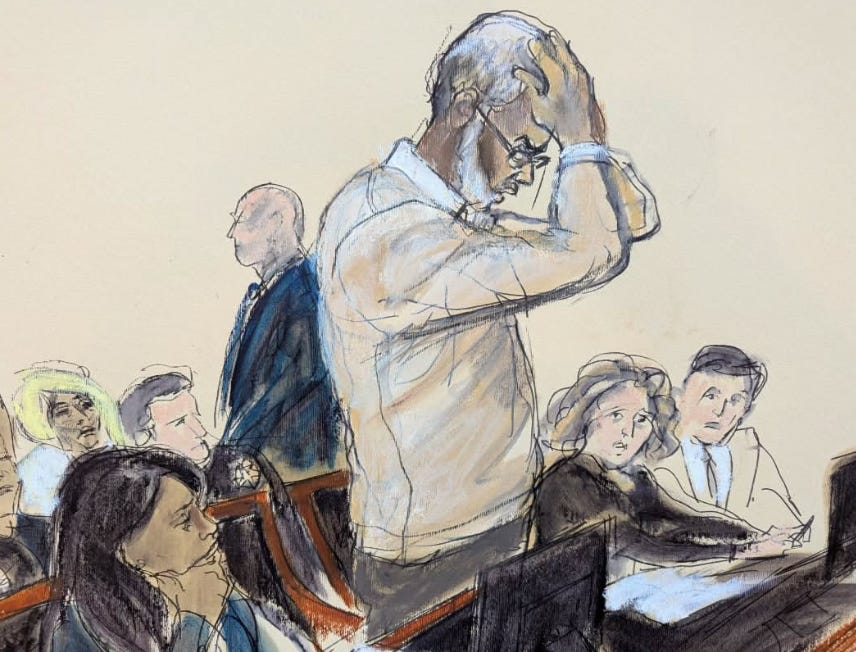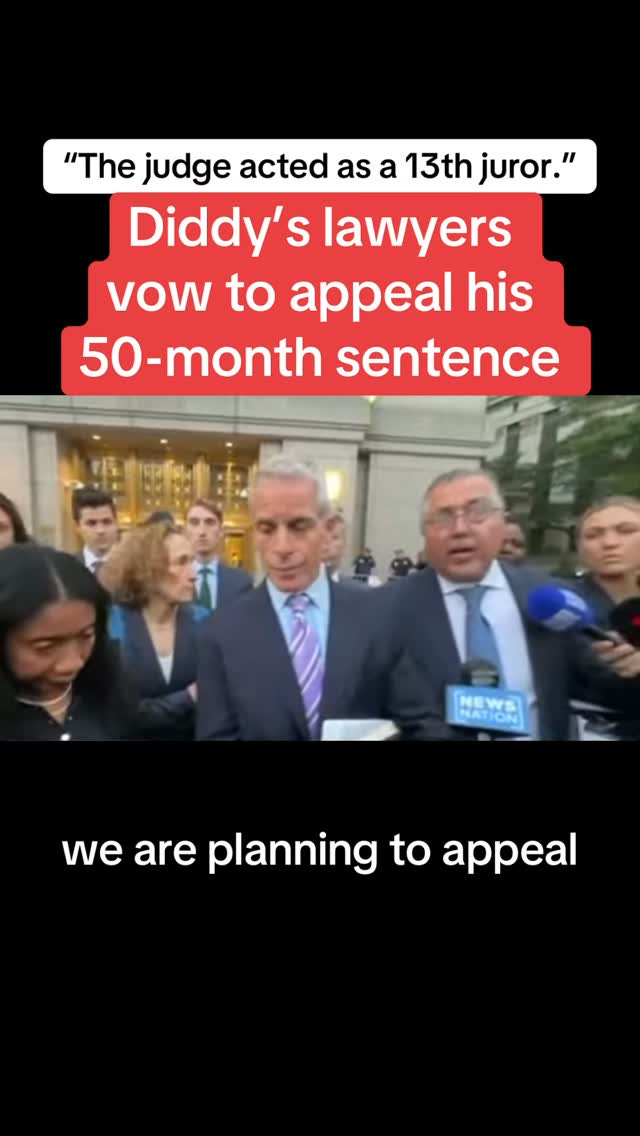A judge sentenced Diddy to 4 years in prison. Here's everything that went into it.
Sean 'Diddy' Combs' appeal could be the first test of a U.S. Sentencing Commission guidelines amendment that says judges can't consider acquitted conduct.
Sean “Diddy” Combs will spend another approximately three years behind bars under a 50-month prison sentence that a judge on Friday said “is a serious sentence that reflects the gravity of your crimes and conduct.”
“This is hard time in prison away from your family, friends, children and your community. But you will have a life afterward and it provides you with a path toward rehabilitation,” U.S. District Judge Arun Subramanian told Combs at the end of a five-hour hearing.
Combs will be credited for the approximately 13 months he’s already spent in custody. His lawyer Marc Agnifilo vowed to appeal the sentence and said Subramanian acted as “a 13th juror” when he said Combs should be punished more severely because his two transportation for prostitution convictions involved force, fraud or coercion.
Jurors in July acquitted Combs of the more punitive charges of sex trafficking by force and racketeering conspiracy.
Speaking outside the Daniel Patrick Moynihan Courthouse in Manhattan, Agnifilo said jurors “found there was not coercion. And I think the judge said coercion today as a basis for a sentence at least a dozen times.”
“We think that that is unconstitutional,” Agnifilo said.
Agnifilo was referring to a change in the U.S. Sentencing Commission guidelines last year that says judges can no longer consider acquitted conduct at sentencing.
Agnifilo and his co-counsel argued the guidelines amendment, coupled with the jury’s not guilty verdicts, meant none of the enhancements prosecutors proposed for issues such as fraud / coercion and vulnerable victims could apply.
Prosecutors, meanwhile, recommended 135 months in prison, which is 11 years and three months, and said none of the evidence they wanted the judge to consider should be excluded as acquitted conduct. The force, fraud or coercion enhancement applies to the prostitution convictions “under a significantly broader range of facts than the sex trafficking statute,” they wrote in a 164-page filing.
“Unlike the sex trafficking statute which requires that the defendant intend for coercion or fraud to be ‘used to cause the person to engage in a commercial sex act,’ the enhancement applies merely if the offense ‘involved’ threats or coercion (even if the threats and coercion were not causally connected to a specific sex act),” according to the filing.
Prosecutors also essentially argued the guideline amendment is unconstitutional, because they argued that considering acquitted conduct still is constitutional under case law, including U.S. 2nd Court of Appeals precedent, which includes the Southern District of New York. Judge Subramanian appeared to agree, noting shortly after the hearing began Friday about 10 a.m. that, “there is no guidance from any court on the proper application of the acquitted conduct provision.”
“The guideline is ambiguous, given that, in most cases, including this one, juries don’t acquit defendants of conduct. They acquit them of charges,” the judge said, according to a court reporter’s transcript of the hearing. “And we don’t have a crystal ball to tell us what the jury in this case was thinking when they acquitted Mr. Combs of the RICO and sex trafficking charges.”
Subramanian said the solution is to determine if the conduct at issue that is part of an acquitted charge “also establishes, in whole or in part, the instant offense of conviction.”
“Nothing in the guidelines suggests that the commission intended for courts to ignore conduct relevant to establishing the offense in question, so a more restrictive reading of this language is untenable,” Subramanian said. “Of course, this will lead to some line drawing questions, which the commission recognized, stating that the court will be in the best position to determine whether such overlapping conduct establishes, in whole or in part, the instant offense of conviction and, therefore, qualifies as relevant conduct. The court has done its best to do that.”
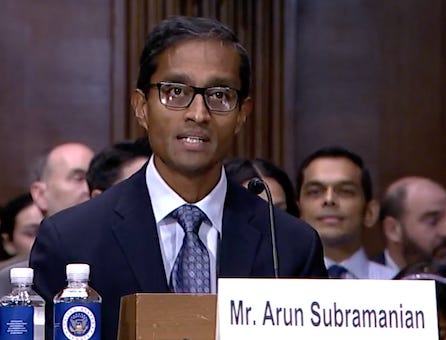
The judge used that logic when concluding Combs’ sentence should be longer because he used force, fraud or coercion, in part because Combs threatened to release sexually explicit videos of Ventura and threatened to stop paying Jane’s $10,000 monthly rent.
But it wasn’t all bad for Combs: Subramanian concluded that an enhancement prosecutors wanted for threats-of-fear, which he said would have a “dramatic impact,” shouldn’t apply. He also didn’t apply an enhancement for serious bodily injury, and he declined to enhance Combs’ sentence for obstructing justice, which prosecutors sought over Combs’ marking of notepads found in his cell as “legal” early in his incarceration during the bail review process, in an apparent attempt to invoke attorney-client privilege.
Subramanian called the conduct “troubling” but said “a full record was never made as to what happened exactly or who was responsible for it, Mr. Combs, his counsel, present or former, or both.”
In another loss for prosecutors, Subramanian declined to enhance Combs’ sentence because his victims were vulnerable. The judge agreed with the U.S. Probation Office, which recommended a 70-87 month prison sentence, that the fraud and coercion enhancement covers the vulnerability of the victims.
“What made Combs’ coercion effective was that the victims were vulnerable and that was for lots of reasons, including prior sexual and violent experiences and age,” Subramanian said.
Still, Subramanian rejected Combs’ argument that his former girlfriends aren’t victims at all, as well as his argument that the men hired as prostitutes aren’t victims, either.
In arguing for a harsher sentence, Assistant U.S. Attorney Misty Slavik said Combs “doesn’t understand or appreciate the gravity of his criminal conduct” and noted “he has booked speaking engagements in Miami for next week.”
“That is the height of hubris, Your Honor. Assuming this court is going to ignore the guidelines, ignore the law, ignore the recommendation of the probation office, and the government and just let him be in Miami on Monday, that is the opposite of demonstrating respect for the law,” Slavik said.
Combs’ lawyer Xavier Donaldson said the event is not a speaking engagement but a “teaching engagement” with incarcerated people. Donaldson was one of five defense lawyers who spoke on Friday. Nicole Westmoreland cried as she spoke of Combs’ achievements and contributions, and Brian Steel told the judge, “I sit here with tears in my eyes because I can’t believe we’re here” and called Combs “a civil rights leader.”
Steel also said he’s been “punished severely already” through his incarceration at the Metropolitan Detention Center.
“Sean is not a typical person in custody. Everyone knows him. There are certain people who it’s a trophy for them, they get recognition if they harm him. As the court may not know, or may know, and it’s on file, the guards stopped a person who was armed with a shank who was right on top of Sean and was about to cut him. Every day he lives in fear,” Steel said.
The U.S. Probation Office’s recommendation isn’t public, but according to the defense and prosecution filings, it recommended a guideline range of 70-87 months and a 60-month prison sentence.
Judge Subramanian agreed Friday that Combs’ guideline range is 70-87 months after calculating his offense level at 27, but he didn’t specifically state how he went from that to a final sentence of 50 months. Combs’ lawyers asked the judge to impose a downward departure from the guideline range, which prosecutors opposed, but the judge didn’t mention the term on Friday when explaining the 50-month sentence and said early in the hearing that he wouldn’t impose one.
Subramanian, however, didn’t specify how he went from the 70-87 range to a final sentence of 50 months. Combs’ lawyers asked in their filings for him to depart downward, which prosecutors opposed, but the judge said early in the hearing that he wouldn’t do so.
Subramanian said prosecutors’ 135-month recommendation is “over the statutory maximum of the sentences on these offenses ran concurrently” and “not reasonable.” He said he agrees “that a serious sentence is warranted,” including for the “profound impact on Ms. Ventura and Jane” and “the time span, over a decade.” He said cases with similar sentences for prostitution “involved defendants with more extensive criminal history scores, and they also involved things like murder, minor victims, an expansive prostitution enterprise with numerous victims and the like.”
The judge also said a 135-month sentence doesn’t account for Combs’ “mitigating circumstances, such as his lack of recent criminal history, his family ties and ties to the community, his substance abuse, and mental health history, which the court has considered.”
Turning to the defense, Subramanian said the 14-month recommendation “does not adequately account for the aggravating factors: The severity of the conduct at issue, the violence, the drugs, the coercion, and the devastation that it caused to Mr. Combs’ victims.”
“The defense’s proposal is insufficient to satisfy the goals of sentencing, including to reflect the seriousness of the offense, to promote respect for the law, to provide just punishment, and to afford adequate deterrence among others,” Subramanian said.
He said prosecutors are correct that “every case has to be evaluated on its own facts and circumstances, and the facts and circumstances of this case are unique.”
“Weighing all the relevant factors and considering the evidence that the court heard at trial, and the information provided by the parties and the probation department, the court determines that the sentence sufficient but not greater than necessary to comply with the purposes set forth in 18, U.S.C., Section 3553(a)(2) is a sentence of 50 months of incarceration,” the judge said.
Subramanian also ordered Combs to pay a $500,000 fine, which he said “is an upward variance from the guidelines, but is warranted given the guideline does not adequately reflect the severity of the defendant’s conduct nor the defendant’s immense resources, which enabled his crimes.”
Judge hears from victims and supporters
All of Combs’ children except his two-year-old daughter spoke in court, as did Combs’ friend Gary Johnson, a reverend in Miami who is the former president of the Florida chapter of the Southern Christian Leadership Conference.
Prosecutors said earlier that Combs’ former assistant who testified under the pseudonym Mia wanted to speak, but she didn’t. Slavik told the judge Mia felt “intimidated” by Combs’ lawyers. That follows their written opposition to her being allowed to speak, which offered a blunt take on Mia’s role in trial: “’Mia’ was permitted to come into a courtroom, assume a fake identity (complete with a made up voice and demeanor), and lie about a defendant in a criminal case, all behind the shroud of anonymity.”
Prosecutors called the letter “offensive, unprofessional, and on its face nothing more than a blatant attempt to smear a victim who bravely testified about years of traumatic events she experienced at the defendant’s hands.”
“Mia was brave to testify at trial and is even more brave to be willing to speak the truth at sentencing after the verdict,” prosecutors wrote. “The defense’s fear of one victim speaking for less than five minutes speaks volumes as to what it believes may be the impact of her telling the truth.”
Judge Subramanian said on Thursday that Mia could speak. She was an alleged victim of forced labor in Combs’ racketeering conspiracy charge, on which he was acquitted, and she testified he raped her, which was testimony Subramanian allowed regarding uncharged acts. But the judge said it doesn’t matter that she’s not a victim of the two crimes of which jurors convicted Combs.
“Though the defense argues that Mia has been discredited, it doesn’t explain why she should be excluded given that the defense will of course be afforded a ‘fair opportunity to respond’ to any remarks that Mia offers,” the judge wrote, quoting a 2015 2nd Circuit U.S. Court of Appeals ruling.
Slavik said early in Friday’s hearing that Mia wouldn’t be speaking “at least in part due to the letter submitted by defense on Wednesday, which can only be described as bullying.”
After the hearing, attorney Gloria Allred said the judge didn’t allow her clients who are suing Combs to speak. Asked what she thinks of the 50-month sentence, Allred said many of her clients “were very concerned that he might walk free by the end of this year.”
“They were very much afraid that he would retaliate against them. And so I think that they will be happy that he will be at least in prison for a number of years,” Allred said.
Combs’ lawyers filed dozens of letters from supporters, including Metropolitan Detention Center inmates who praised his positive influence and the life skills program he created called “Free Game with Diddy”
Combs’ supporters included Virginia “Gina” Huynh, who was charged as a victim in the indictment but never testified. She wrote that she “felt pressured to feel like a victim” during meetings with prosecutors.
“I told them I was not but they insisted that I was, even when I expressed my truth otherwise,” according to the letter.
Combs wrote a 3 1/2 page letter that Subramanian said had an “inappropriate” tone.
You can read by clicking the images below or clicking this link.

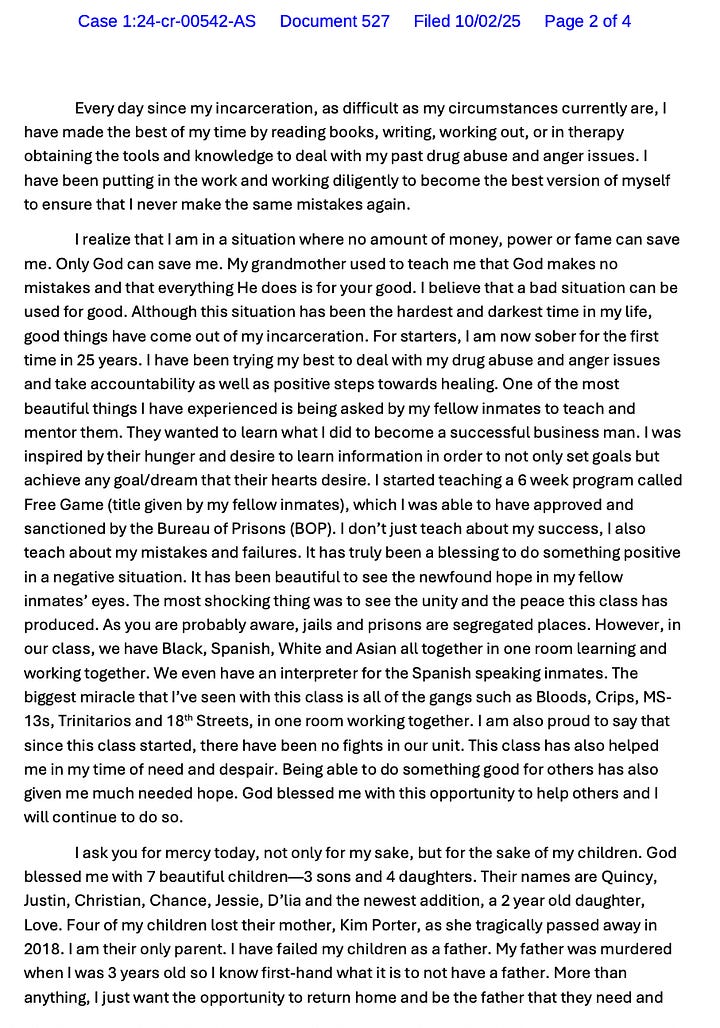


Combs’ lawyers also played this video for the judge:
Combs spoke before Judge Subramanian sentenced him. Here’s a transcript:
I want to thank you for giving me the chance to finally speak up for myself. One of the hardest things that I’ve had to handle is having to be quiet, not being able to express how sorry I am for my actions. I want to personally apologize again to Cassie Ventura for any harm or hurt that I’ve caused to her emotionally or physically. I don’t take that lightly. I would like to apologize to her family. I’m so sorry.
I would like to apologize to Jane. I didn’t mean to hurt you. I’m sorry that I brought you into my mess.
I also want to personally apologize to all the victims of domestic violence, because I know that that video, that disgusting, despicable video, triggered a lot of people all around the world.
Domestic violence will always be a heavy burden that I will have to forever carry. My actions were disgusting, shameful, and sick. I was sick. Sick from the drugs. I was out of control. I needed help, but I didn’t get the help. Because of that, I can make no excuse. I could really make no excuse because, because I knew better. My mother raised me better. I was taught better. My faith taught me better.
I got lost in my journey of life. I’m not this larger than life person. I’m just a human being. And I be trying my best. I got lost in the excess. I got lost in my ego.
And because of my decisions, I lost my freedom. I lost the opportunity to effectively raise my children and be there for my mother. I lost all my businesses. I lost my career. I totally destroyed my reputation. But most of all, I lost my self-respect.
I been humbled and broken to my core. I hate myself right now. I been stripped down to nothing. I really am truly sorry for it all, no matter what they say.
I want to apologize to my seven children, Quincy, Justin, Christian, Jessie, D’Lila, Chance, Love, I failed as a father. I’m so sorry. Y’all deserve better.
To my mother, mommy, I failed you as a son. I’m sorry. You taught me better. You raised me better.
I know to whom much is given, so much is expected. I know I failed my community. Growing up as a kid, I just wanted to be a shining example of what we could do. When I say we, we as people of color, that we could own our own businesses, take care of our own communities, raise our own children, solve our own problems, create our own wealth, take care of our own problems. And that was my mission. And I got lost. I’m not this bad person. I’m sorry to my community for letting y’all down.
I want your Honor to know that if given a chance, people can change. I know I’ve changed. I know this because there’s events -- there’s sometimes something can happen in your life that no matter who you were before, what you were going through, you get so shaken that it just changes your trajectory. It just changes you. And it changes you for the better. Sometimes you have to go through life experiences.
These are not excuses. I know that I’ve been changed for the better. I can’t change the past, but I can change the future. I ask Your Honor for mercy. I beg Your Honor for mercy.
I ask Your Honor for a chance to be a father again. I ask Your Honor a chance to be a son again. I ask Your Honor for a chance to be a leader in my community again. I ask Your Honor for a chance to get the help that I desperately need to become a better person. Because I don’t want to let God down.
I don’t want to let my family down. They need me. I let them down. They don’t have no other parent. They’re scared. I’m scared. And I have nobody to blame but myself.
I know I’ll never put my hands on another person again. I know that I’ve learned my lesson. I’m willing to comply with any conditions the court puts upon me. Given a chance, when we talk about the possibility of me sharing my story, it’s not for a scheme to try to get less time. It’s that this story is real. This story is tragic. And if there’s any way, I don’t have nothing else. I have my family, and that’s all I need. I don’t care about the fame or the money or making records or performing. If there’s a chance for me to go into, and touch some kids and touch some inmates that have lost hope. I feel like if your Honor gives me a chance by sharing that story, that this will have a positive outcome. This will have a healing effect. So that at least I could help one person for not ending up like this.
I want to say thank you to the jury. And, your Honor, your Honor gave me the confidence to believe in the jury and to believe that I didn’t have to testify. And the jury came and they sacrificed their time, eight weeks in the summer.
Sacrificed time with their children. And they weighed the evidence. And I thank them for the not guilty verdicts.
And I don’t take lightly my Mann Act conviction. I understand the severity of it, and I’m having to deal with the consequences. And I take full accountability and responsibility.
Your Honor, I know that the prosecution wants you to make an example of me. I just want you to think about making an example of what a person can do if they get another chance.
If you give me another chance, I won’t let you down. And the evidence of that are those beautiful children that got up there and spoke for me.
Thank y’all. I love y’all so much. Proud of y’all.
I would never, ever, ever jeopardize being in this situation again, being away from my family that needs me.
That’s my deterrence. I don’t think nobody wants to come and be in this position.
No matter what anybody says, I know that I’m truly sorry for it all. Thank you.
Judge rejects motion for new trial or acquittal
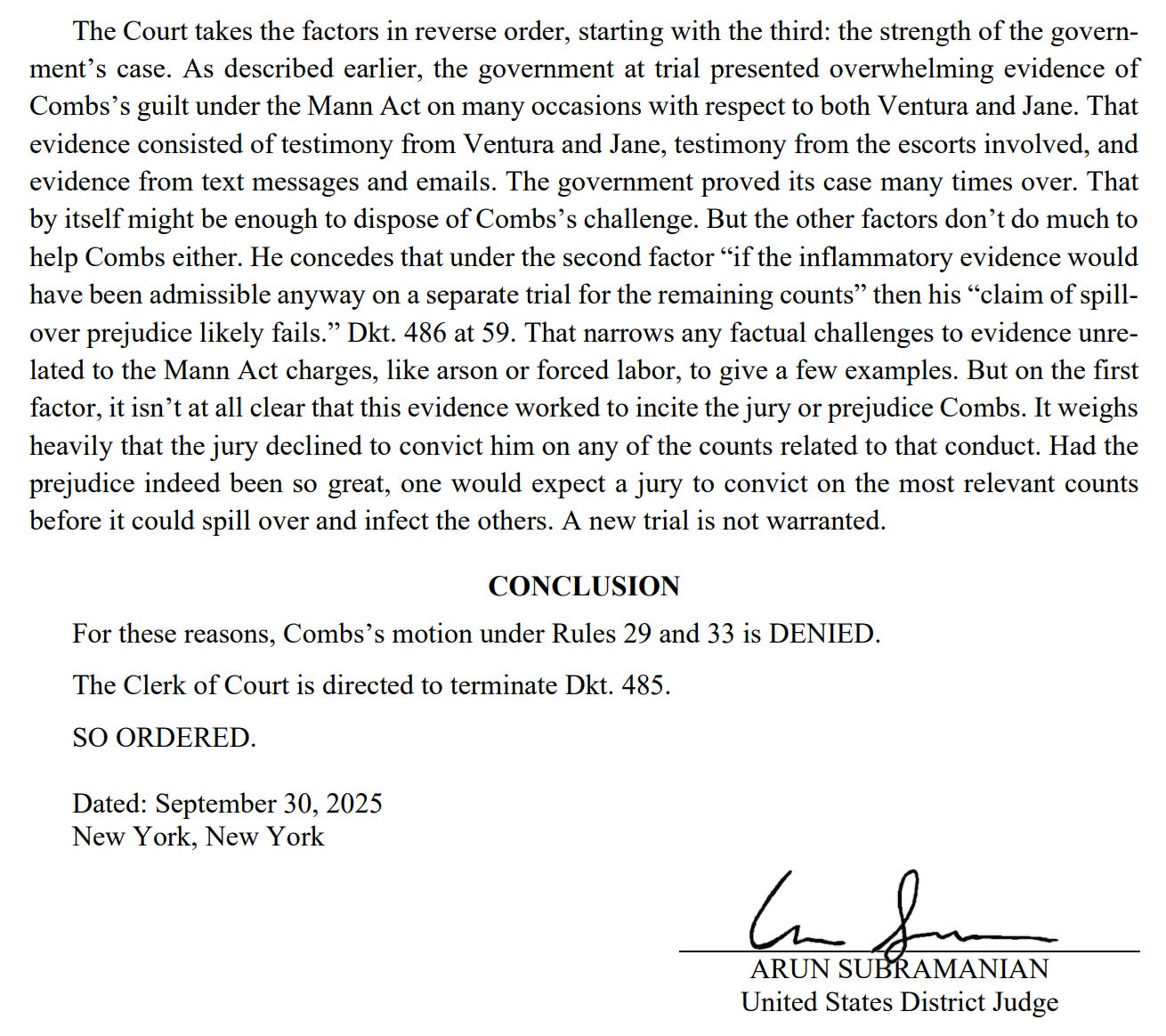
Judge Subramanian on Tuesday denied Combs’ motion for new trial or acquittal on the prostitution charges.
His 16-page order rejected Combs’ lawyers’ “newly proposed definition of prostitution,” which argued a defendant must have a finical motive and that whoever pays for the sex must engage in it.
The judge said the definition presented to the jury, which Combs’ lawyers approved, was correct by defining prostitution under the federal Mann Act as “sex in exchange for money or its equivalent.”
Subramanian said Combs’ argument that a Mann Act defendant needs a financial motive “seems to be conflating two things: the definition of prostitution and the motive of the defendant who transports somebody for prostitution.”
“What happened in this case was transportation for prostitution even under Combs’s understanding of the term: Combs transported the escorts (who were financially motivated) and intended for them to engage in prostitution,” according to the order. “Whether Combs himself was financially motivated never enters the calculus. There’s no basis to adopt Combs’s proposed financial-motive requirement for defendants in Mann Act cases.”
The judge said Combs’ definition of provision as “a strictly bilateral transaction” “would narrow prostitution almost out of existence.”
The judge also rejected Combs argument “that because he’s an amateur pornographer and consumer of pornography, his conviction violates his First Amendment rights.” The First Amend ment applies to conduct that is “inherently expressive,” the judge wrote, citing the 1989 U.S. Supreme Court case California v. Freeman: “at some point, it must certainly be true that otherwise illegal conduct is not made legal by being filmed.”
Subramanian said trial evidence showed Combs typically didn’t notify or ask consent to film the sexual encounters, “and that he masturbated, suggesting that the purpose was his immediate sexual gratification.”
“Combs’s incidental filming resembles the facts of Arcara v. Cloud Books, Inc., in which a bookstore could be shut down to combat the prostitution happening on its premises. 478 U.S. 697 (1986). Even though that restriction affected the distribution of pornographic materials, the shutdown didn’t implicate the First Amendment.”
Even if Combs’ conduct is protected by the First Amendment, “his conviction doesn’t violate it,” the judge wrote. Subramanian cited “the significant federal interest in halting the interstate sex trade, which may be associated with all manner of other criminal conduct.”
“Contrary to Combs’s assertion, his own activities implicated many of these concerns. While paying for sex, he enabled commercial prostitution, distributed illegal drugs, and was physically violent,” the judge wrote. He said Combs’ conduct “sits at the heartland of the Act’s legitimate proscriptions.”
“Unsurprisingly then, his conviction raises no constitutional problem,” Subramanian wrote.
A transcript of the sentencing hearing, with links to other sentencing documents, is available below for paid subscribers. Your paid subscriptions make my work possible.


